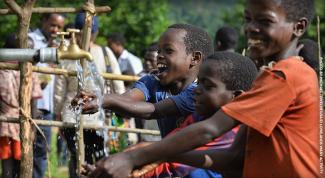BACKGROUND
Ethiopia has made remarkable strides in ensuring access to safe drinking water over the past 20 years, but still faces challenges in overall water, sanitation and hygiene (WASH) coverage. Up to 80% of communicable diseases are still attributed to limited access to safe water and inadequate sanitation and hygiene practices which negatively impact health and nutrition. In Ethiopia, diarrheal disease is the second cause of hospital admission and death among children under five years.
USAID aims to increase access to safe water supply and basic sanitation in rural and urban areas, and encourages greater investment in water-related infrastructure while expanding a nascent private market sector and value chains for sanitation and hygiene products. USAID investments support the construction and rehabilitation of critical drinking water sources in rural areas of Ethiopia where water is scarce. Over the past five years, we have connected over 200,000 Ethiopians to sustainable sources of safe drinking water.
In addition, USAID projects promote healthy behaviors and educate families and communities about safe sanitation and hygiene practices at their homes to prevent illness and disease. We also support the Government of Ethiopia’s efforts by incorporating water, sanitation and hygiene activities into health, education, humanitarian assistance and democracy and governance programs; and water resource management into agriculture and food security activities.
PRIORITIES
USAID’s Transform WASH focuses on construction and rehabilitation of water sources for irrigation, which ensures harvest yields and healthy livestock in drought and post conflict-affected woredas. Irrigation mitigates the negative effects of the Ukraine crisis on Ethiopia’s food security in drought-affected and post-conflict geographic areas. Increasing access to water will accelerate the restoration of markets, furthering peace building efforts. These activities include repairing and restoring access to WASH products and nascent supply chains serving small- and medium-sized enterprises (SMEs), providing economic opportunities to women and youth.
CATALYZE: Market Systems for Growth supports the resilience of private sector firms operating in the WASH sector. In Addis Ababa and select secondary cities, the activity improves access for WASH businesses and consumers through blended finance and digital payment solutions.
USAID’s Resilience Food Security Activities invests in construction and rehabilitation of potable water sources and sanitation facilities through public works. These activities also promote hygiene education, provide water-harvesting technologies to smallholder farmers, and promote watershed management activities.
The new USAID Climate Resilient WASH activity aims to professionalize and expand sustainable, climate-resilient water services in Ethiopia’s drought-prone lowlands. The activity will also increase adoption of key hygiene behaviors, including menstrual health and ending open defecation; improve gender power dynamics; and strengthen the enabling environment for WASH services.
USAID Urban WASH will accelerate access to inclusive and resilient WASH services in targeted, most-needy urban and peri-urban areas. It will strengthen the planning, budgeting and oversight of WASH service providers; improve the operationalization of an independent regulator; enable and professionalize WASH service providers; and extend WASH services to poor and marginalized communities. While not excluding water or hygiene, the activity will focus predominantly on citywide inclusive sanitation, which is the largest gap in urban WASH services.
The new USAID Markets for Sanitation activity will increase gender inclusive and equitable access to, improved sanitation and hygiene products by growing the nascent WASH private sector. The activity will increase the supply and demand for affordable, high-quality sanitation products and services; augment learning to bring innovations to scale; increase private-sector engagement with local authorities; and promote WASH enterprise growth.

